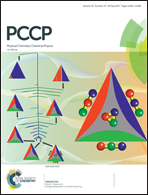Microscale solid-state thermal diodes enabling ambient temperature thermal circuits for energy applications†
Abstract
Thermal diodes, or devices that transport thermal energy asymmetrically, analogous to electrical diodes, hold promise for thermal energy harvesting and conservation, as well as for phononics or information processing. The junction of a phase change material and phase invariant material can form a thermal diode; however, there are limited constituent materials available for a given target temperature, particularly near ambient. In this work, we demonstrate that a micro and nanoporous polystyrene foam can house a paraffin-based phase change material, fused to PMMA, to produce mechanically robust, solid-state thermal diodes capable of ambient operation with Young's moduli larger than 11.5 MPa and 55.2 MPa above and below the melting transition point, respectively. Moreover, the composites show significant changes in thermal conductivity above and below the melting point of the constituent paraffin and rectification that is well-described by our previous theory and the Maxwell–Eucken model. Maximum thermal rectifications range from 1.18 to 1.34. We show that such devices perform reliably enough to operate in thermal diode bridges, dynamic thermal circuits capable of transforming oscillating temperature inputs into single polarity temperature differences – analogous to an electrical diode bridge with widespread implications for transient thermal energy harvesting and conservation. Overall, our approach yields mechanically robust, solid-state thermal diodes capable of engineering design from a mathematical model of phase change and thermal transport, with implications for energy harvesting.



 Please wait while we load your content...
Please wait while we load your content...